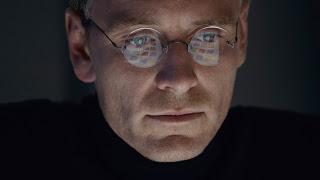 Steve Jobs (2015) isn't your average biopic. Danny Boyle tries an episodic look at Jobs' life and achievements, probing his personality through high-pressure situations. It's an intriguing approach that doesn't fully humanize its hero.
Steve Jobs (2015) isn't your average biopic. Danny Boyle tries an episodic look at Jobs' life and achievements, probing his personality through high-pressure situations. It's an intriguing approach that doesn't fully humanize its hero.Steve Jobs (Michael Fassbender) helps found Apple, Inc. with Steve Wozniak (Seth Rogan) and becomes a millionaire. His abrasive single-mindedness alienates colleagues and loved ones alike: besides bad press over the failure of his Mackintosh 128K, he dodges ex-girlfriend Chrisann Brennan (Katherine Waterston) and daughter Lisa (Perla Haney-Jardine). Jobs loses his job with Apple and flops with his own start-up, NeXT, only to come back in the late '90s with the iMac.
Unlike the feeble Jobs (2013), Aaron Sorkin's three act script focuses on the launch of the 128K, NeXT's failure and his 1998 return with interstitial montages and flashbacks to fill in backstory. Boyle's exuberant direction matches the high-pressure scenarios, with Jobs' personal and professional lives crashing together. However, his more ostentatious flourishes (the recurring motif of raging crowds waiting for Jobs' presentations) seem jarring in the claustrophobic setting.
Like all movie tycoons from Charles Foster Kane onward, Jobs is a professional success but a personal failure. Chrisann notes that she and Lisa suffer on welfare while Jobs nets $400 million; he denies partner Steve Wozniak's (Seth Rogan) requests to acknowledge his team. Indeed, Jobs seems a borderline sociopath, unable to absorb humanity aside from fleeting connection with Lisa. By 1998 he's a total wreck, realizing that his actions have damaged lives of friends and coworkers. It's a familiar tragedy where the hero's given a last minute out.
The obvious comparison is The Social Network, another Sorkin script about a misanthropic visionary. That film's flaw is that Sorkin and David Fincher make Mark Zuckerberg so crabbed and churlish, his remorse seems pathetically insincere. Boyle's a more human director, giving genuine gravitas to Jobs' admission that "I'm poorly made" and relationship with Lisa. Nonetheless, Steve Jobs zeros in so closely on Jobs' personal failings that his supposed greatness doesn't resonate.
Nonetheless, one can't fault Michael Fassbender's performance. Not a strong physical match for Jobs, Fassbender nonetheless masks a cagey nerve and fragile ego with boundless, arrogant energy. Kate Winslet and Jeff Daniels aren't well-served in schematic roles: both long-suffering foils to Jobs, they don't register individually. Seth Rogan and Michael Stuhlbarg give excellent character turns as Jobs' colleagues.
Many critics are giving Steve Jobs raised, yet I'd consider it a qualified success. Certainly Boyle and Sorkin's unique structure avoids the pitfalls of cradle-to-grave biopics. Nonetheless, they neither significantly humanize the man, nor leave him conflict enough to be an enigma. Steve Jobs' subject is less flawed giant than all-too-familiar anti-hero.

